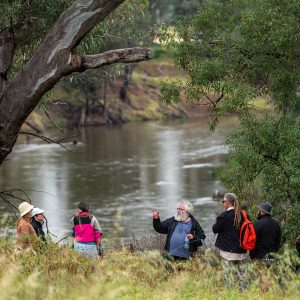September 8, 2025
First Nations Peoples have stressed to Western scientists that Country is in distress and traditional knowledge is key to mitigating the impacts of climate change. Traditional Knowledge and Traditional Knowledge Methods used to read land and seascapes are intrinsically linked to climate by First Nations peoples. These methods are embedded in cultural practices that have been passed down and entrusted across generations. Articles 2, 3, 4 and 5 of the United Nations Declaration on the Rights of Indigenous Peoples identify that all risks that threaten the continuation of cultural practice and obligation to maintain, strengthen and protect cultural knowledge infringe peoples’ right to exist.
The National First Peoples Gathering on Climate Change, held in Cairns in 2021, investigated whether building connections with and among First Nations peoples and Western scientists had the potential to acknowledge and respect both knowledge systems for the benefit of all. Four key practices were applied to build a culturally safe space at the Gathering:
- (i) Indigenous governance;
- (ii) cultural protocols and co-design;
- (iii) deeply respectful partnerships for weaving knowledge;
- and (iv) Indigenous networks. Building connections among First Nations Peoples proved highly empowering.
First Nations Peoples found the Gathering useful for synthesising and elevating a shared agenda woven across knowledge systems. Different perspectives shared on the impacts of climate change on people and Country built a mutual understanding, acknowledgement and respect. As a result, the usability of both knowledge systems was established. Learnings from the Gathering are practical outcomes that First Peoples are sharing with communities. Several risks were also identified, including differing intergroup opinions about priorities. The difficulty remains in understanding technical complexities, and in some instances, a rejection of the value of Western science. Still, the Gathering allowed space for recognition that climate justice is founded on respect and recognition for First Nations Peoples.

